99-year leases poised to become collateral

Lloyd Gumbo Senior Reporter
Beneficiaries of the land reform programme who have been issued with 99-year leases should be able to access funding from financial institutions once an agreement is reached on the bankability of the leases, Reserve Bank of Zimbabwe Governor Dr John Mangudya has said.
He made the remarks at the 72nd annual congress of the Commercial Farmers Union officially opened by Vice President Emmerson Mnangagwa in Harare on Wednesday.
Dr Mangudya, who presented a paper on “Breaking the vicious cycle of productivity in agriculture”, said it was a matter of time before the parties involved reached an agreement on the bankability of 99-year leases.
“Government is finalising with the banks and ourselves the transferability of leases to ensure that they become an instrument that can be used as collateral,” he said.
“The major issue that is there in the lease agreement is basically the transferability, to see how best this can be done. But with the Constitution now protecting the land, I think it is easy to deal with the 99-year leases,” said Dr Mangudya.
“The whole idea is to ensure the leases become bankable. To ensure that we monetise the land, we get value out of the land. And then we can at least have more resources going to the land and then we can produce.”
Dr Mangudya said Government was also committed to compensating former white farmers for improvements on land that was reclaimed during the land reform exercise.
He said the Ministry of Lands and Rural Resettlement, with the help of development partners, was in the process of evaluating the improvements on farms that Government promised it would compensate.
“The Government of Zimbabwe never refused to compensate farmers who lost their farms,” said Dr Mangudya. “What is required is to ensure that it is done methodically.
“So, this one is an evaluation process. After evaluation, we sit down with the farmers and say how best do we compensate?”
Dr Mangudya said since agriculture was the backbone of the Zimbabwean economy, it was important for the sector to perform.
Officially opening the CFU congress, VP Mnangagwa said Government was committed to the revival of the agricultural sector to fulfil President Mugabe’s vision of empowering Zimbabweans through agriculture.
In a speech read on his behalf by Minister of State in his Office, Cde Clifford Sibanda, VP Mnangagwa castigated corrupt public officials.
“As Government, we will continue to support the improvement of the viability of the agricultural industry and look forward to receiving your recommendations on how Government can assist in solving some of our farmers’ challenges,” he said.
“May I, at this stage, unreservedly condemn those who ask for bribes in the discharge of their public duties and in equal measure, those who pay such bribes.
“We must shun all forms of corruption and galvanise ourselves to realise the potential we have as a nation, which potential we must develop through increasing agricultural production.”
VP Mnangagwa said President Mugabe summarised what Zimbabwe needed to do to attain economic growth when he enunciated a 10-point plan in his recent State-of-the-Nation address to Parliament recently.
He said Zimbabwe had gone past the land redistribution exercise as a strategy to realise the full agricultural potential of the country.
“To that end, the agricultural focus of Zim-Asset, which was given further impetus in the 10-point plan, is to develop sustainable agricultural production, productivity, access to markets, multi-disciplinary and multi-dimensional development,” said VP Mnangagwa.
“Collectively, therefore, we hold the future of Zimbabwe’s agriculture in our hands. This is why we are convinced that the democratisation of land ownership which sought to empower the majority of Zimbabweans to have access to agricultural land, when supported by a raft of policy measures we are putting in place as Government, should, with time, enable us to unlock full potential and meet our strategic vision of a prosperous, diverse and competitive agricultural sector.”
VP Mnangagwa said it was important to embrace irrigation than rely on rain-fed agriculture at a time climate change was seriously impacting on agricultural production.
In his remarks, CFU president Mr Peter Steyl said there were a number of things that needed to be addressed for the agricultural sector to reach its full potential.
“We need to eradicate all forms of corruption,” he said. “We also need to embrace new technologies, improve rural road networks and we also need to invest in railway and electricity.”
Mr Steyl said the electricity that fertiliser company Sable Chemical was using was enough to irrigate at least 162 000 hectares of land and should be diverted to that use.
He said after the diverting the electricity, the ammonium nitrate produced by Sable Chemical could be imported at a lower cost.







Comments